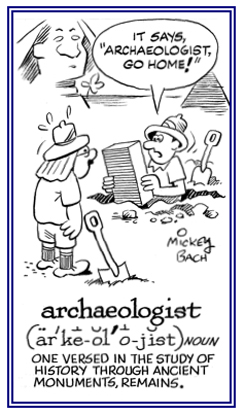-ology, -logy, -ologist, -logist
The word -ology is a back-formation from the names of certain disciplines. The -logy element basically means "the study of ____". Such words are formed from Greek or Latin roots with the terminal -logy derived from the Greek suffix -λογια (-logia), speaking, from λεγειν (legein), "to speak".
The suffix -ology is considered to be misleading sometimes as when the "o" is actually part of the word stem that receives the -logy ending; such as, bio + logy.
Through the years -ology and -logy have come to mean, "study of" or "science of" and either of these suffixes often utilize the form of -ologist, "one who (whatever the preceding element refers to)".
The examples shown in this unit represent just a small fraction of the many words that exist in various dictionaries.
archeologist, archaeologist
(s) (noun); archeologists; archaeologists
(pl)
A professional scholar who studies and reconstructs the human past through its physical remains: The work of an
archaeologist involves the scientific finding, collecting, cleaning, sorting, identifying, and the measuring of objects found in or on the earth or sea.
Usually the motives of archeologists are to record and to interpret ancient cultures rather than to collect and to display artifacts for a profit.
 © ALL rights are reserved.
© ALL rights are reserved.
Go to this Word A Day Revisited Index
so you can see more of Mickey Bach's cartoons.
archology
(s) (noun), archologies
(pl)
1. The theory or study of origins: Since Judy was very interested in the beginnings of different things, she decided to do more research in archology.
2. The science of government: Marc thought he would involve himself in the discipline of archology, since he wanted to know much more about different types of governing authorities and various regimes of countries around the world.
arcology
(s) (noun) (no pl)
1. In urban studies, a concept in which the ideal city involves three-dimensional building structures: In addition, arcology intends to preserve more of the natural environment, a possibility of combining architecture and ecology as envisioned by Paolo Soleri.
2. Etymology: arc(hitecture) plus (ec)ology.
areology
The study of the planet Mars.
arthrology
(s) (noun), arthrologies
(pl)
The scientific study of connecting bone structures: When he finished his medical training, Lyle was convinced that he wanted to specialize in arthrology so he could develop a better understanding of the joints, ligaments, etc. of his patients.
arthropathology
(s) (noun), arthropathologies
(pl)
The study of the various diseases that occur between the bones of the body: There was an entire department at the medical school for arthropathology, allowing the students to study the diseases of the connecting links in the fingers, toes, knees, elbows, etc. under scientific conditions.
asteroseismologist
A specialist in the measuring of starquakes.
asteroseismology
1. Measuring starquakes.
2. The study of the interior of stars by means of oscillations on their surfaces.
The oscillations studied by asterioseismologists are driven by thermal energy converted into kinetic energy of pulsation. This process is similar to what goes on with any heat engine, in which heat is absorbed in the high temperature phase of oscillation and emitted when the temperature is low.
The star on which this technique has been applied most effectively is the Sun, where the technique is known as helioseismology.
The stars that asteroseismologists study are constantly vibrating, sending compression waves richocheting through their interiors to the surface, where they manifest as changes in the stars’ brightness.
—"Asteroseismology, an intriguing new field", Omni, magazine;
February, 1994; page 22.
astrobiology
(s) (noun), astrobiologies
(pl)
1. A branch of biology concerned with the discovery or study of life on the celestial bodies in outer space.
2. The study of the movements of heavenly bodies and how these patterns affect living systems on earth.
3. Research in the possible relationships of all living things in the universe.
astrogeology
(s) (noun) (no pl)
The study of the origin, history, and structure of cosmic bodies other than Earth; the geology of celestial bodies: Astrogeology is the science dealing with the arrangement and composition of planets and other heavenly bodies in the solar system.
astrolithology
1. The field of astrogeology (a planetary science discipline concerned with the geology of the celestial bodies; such as, the planets and their moons, asteroids, comets, and meteorites) which focuses on the study of rocks and the conditions by which they form.
2. The science of meteoritic stones.
astrology (uh STRAHL uh jee)
A form of divination based on the theory that the movements of the celestial bodies; such as, the stars, the planets, the sun, and the moon influence human affairs and determine the course of events.
The study of the influences of the stars on human destinies: "Each day he would check the astrology section in his newspaper to to see what it said about his sign."
astrology, astronomy
astrology (uh STRAHL uh jee) (
noun)
A form of divination based on the theory that the movements of the celestial bodies; such as, the stars, the planets, the sun, and the moon influence human affairs and determine the course of events: Each day Chuck would check the astrology section in his newspaper to see what it said about his astrological sign.
astronomy (uh STRAHN uh mee) (
noun)
The "scientific study" of heavenly bodies, particularly stars: Muriel wanted to study astronomy so she could learn more about the science of the universe.
Leticia's astronomy professor was very well informed and had a good sense of humor. In fact, he was even patient when people would ask him about astrology, seemingly confusing the scientific study of the universe with the suggestion that the stars and constellations influence human affairs.
astrometeorologist
Someone who investigates the relations between the sun, moon, and stars; as well as, their influences on the weather of the earth.



